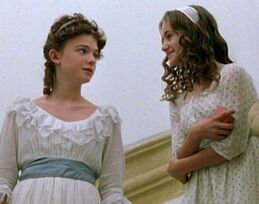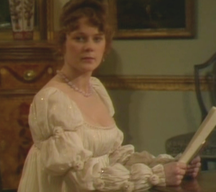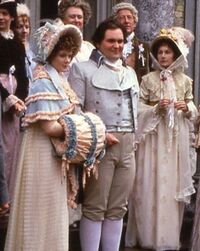Harriet of the Reading Jane Austen podcast discusses (starting at 34:30) the reasons for feeling some sympathy for Maria, including the fact that because she was kept in the country and not exposed to the variety of people she would have met if she had had a "season" in London, she was a sitting duck for Henry Crawford's seductive flirtation. However, as Harriet acknowledges, the decisions Maria makes are her own.
 Young Maria and young Fanny, 1999 movie version
Young Maria and young Fanny, 1999 movie version - The young people were all at home, and sustained their share in the introduction very well... [Maria and Julia] were more at a loss from being younger and in greater awe of their father... But they were too much used to company and praise to have anything like natural shyness; and their confidence increasing from their cousin’s total want of it, they were soon able to take a full survey of her face and her frock in easy indifference.
- [Maria and Julia] could not but hold [Fanny] cheap on finding that she had but two sashes, and had never learned French; and when they perceived her to be little struck with the duet they were so good as to play, they could do no more than make her a generous present of some of their least valued toys, and leave her to herself, while they adjourned to whatever might be the favourite holiday sport of the moment, making artificial flowers or wasting gold paper.
- To her cousins [Fanny] became occasionally an acceptable companion. Though unworthy, from inferiority of age and strength, to be their constant associate, their pleasures and schemes were sometimes of a nature to make a third very useful, especially when that third was of an obliging, yielding temper; and they could not but own, when their aunt inquired into her faults, or their brother Edmund urged her claims to their kindness, that “Fanny was good-natured enough.”
- Maria and Julia both disparage Fanny's ignorance in this conversation with their Aunt Norris.
- it is not very wonderful that, [even] with all their promising talents and early information, they should be entirely deficient in the less common acquirements of self-knowledge, generosity and humility.
- There was no positive ill-nature in Maria or Julia; and though Fanny was often mortified by their treatment of her, she thought too lowly of her own claims to feel injured by it.
 Samantha Bond as Maria Bertram, 1983 mini-series
Samantha Bond as Maria Bertram, 1983 mini-series - The Miss Bertrams were now fully established among the belles of the neighbourhood; and as they joined to beauty and brilliant acquirements a manner naturally easy, and carefully formed to general civility and obligingness, they possessed its favour as well as its admiration. Their vanity was in such good order that they seemed to be quite free from it, and gave themselves no airs; while the praises attending such behaviour, secured and brought round by their aunt, served to strengthen them in believing they had no faults.
- Being now in her twenty-first year, Maria Bertram was beginning to think matrimony a duty; and as a marriage with Mr. Rushworth would give her the enjoyment of a larger income than her father’s, as well as ensure her the house in town, which was now a prime object, it became, by the same rule of moral obligation, her evident duty to marry Mr. Rushworth if she could.
- [Mrs. Norris claims] Maria was indeed the pride and delight of them all—perfectly faultless—an angel;
- Edmund was the only one of the family who could see a fault in the business; but no representation of his aunt’s could induce him to find Mr. Rushworth a desirable companion. He could allow his sister to be the best judge of her own happiness, but he was not pleased that her happiness should centre in a large income.
- Maria’s notions [about the attractive Henry Crawford] were more confused and indistinct. She did not want to see or understand. “There could be no harm in her liking an agreeable man."
- Edmund and Julia were invited to dine at the Parsonage, and she was excluded. It was meant and done by Mrs. Grant, with perfect good-humour, on Mr. Rushworth’s account, who was partly expected at the Park that day; but it was felt as a very grievous injury, and her good manners were severely taxed to conceal her vexation and anger till she reached home. As Mr. Rushworth did not come, the injury was increased, and she had not even the relief of shewing her power over him; she could only be sullen to her mother, aunt, and cousin, and throw as great a gloom as possible over their dinner and dessert.
- "the truth is, that Wilcox is a stupid old fellow, and does not know how to drive."
- Unhappy Maria! [Julia] was on the barouche-box in a moment [sitting beside Henry Crawford], [Maria] took her seat within, in gloom and mortification;
- Miss Bertram had very little real comfort: her prospect always ended in Mr. Crawford and her sister sitting side by side, full of conversation and merriment; and to see only his expressive profile as he turned with a smile to Julia, or to catch the laugh of the other, was a perpetual source of irritation, which her own sense of propriety could but just smooth over.
- When they came within the influence of Sotherton associations, it was better for Miss Bertram, who might be said to have two strings to her bow. She had Rushworth feelings, and Crawford feelings, and in the vicinity of Sotherton the former had considerable effect. Mr. Rushworth’s consequence was hers. She could not tell Miss Crawford that “those woods belonged to Sotherton,” she could not carelessly observe that “she believed that it was now all Mr. Rushworth’s property on each side of the road,” without elation of heart;
- Miss Bertram could now speak with decided information of what she had known nothing about when Mr. Rushworth had asked her opinion; and her spirits were in as happy a flutter as vanity and pride could furnish, when they drove up to the spacious stone steps before the principal entrance.
- Miss Bertram had all the distinction with each that she could wish.
- Miss Bertram, displeased with her sister [for talking about the upcoming marriage with Mr. Rushworth] led the way.
- [Maria leaves Mr. Rushworth behind at the gate and goes off with Henry Crawford] smiling with all the good-humour of success, she said, “Thank you, my dear Fanny, but I and my gown are alive and well, and so good-bye.”
- Miss Bertram had [hoped she would ride back sitting beside Henry Crawford], and was a little disappointed; but her conviction of being really the one preferred comforted her under it, and enabled her to receive Mr. Rushworth’s parting attentions as she ought.
- The day at Sotherton, with all its imperfections, afforded the Miss Bertrams much more agreeable feelings than were derived from the letters from Antigua, which soon afterwards reached Mansfield.
- Maria was more to be pitied than Julia; for to her the father brought a husband, and the return of the friend most solicitous for her happiness would unite her to the lover, on whom she had chosen that happiness should depend. It was a gloomy prospect, and all she could do was to throw a mist over it, and hope when the mist cleared away she should see something else.
- Sir Thomas would have been deeply mortified by a suspicion of half that his daughters felt on the subject of his return...
- Maria, with only Mr. Rushworth to attend to her... had missed Mr. Crawford grievously.
- [Edmund tells Maria] "In all points of decorum your conduct must be law to the rest of the party.” This picture of her consequence had some effect, for no one loved better to lead than Maria; and with far more good-humour she answered, “I am much obliged to you, Edmund; you mean very well, I am sure: but I still think you see things too strongly; and I really cannot undertake to harangue all the rest upon a subject of this kind.
- It was, indeed, a triumphant day to Mr. Bertram and Maria. Such a victory over Edmund’s discretion had been beyond their hopes, and was most delightful. There was no longer anything to disturb them in their darling project, and they congratulated each other in private on the jealous weakness to which they attributed the change, with all the glee of feelings gratified in every way.
- The sister with whom she was used to be on easy terms was now become her greatest enemy: they were alienated from each other; and Julia was not superior to the hope of some distressing end to the attentions which were still carrying on there, some punishment to Maria for conduct so shameful towards herself as well as towards Mr. Rushworth. With no material fault of temper, or difference of opinion, to prevent their being very good friends while their interests were the same, the sisters, under such a trial as this, had not affection or principle enough to make them merciful or just, to give them honour or compassion. Maria felt her triumph, and pursued her purpose, careless of Julia; and Julia could never see Maria distinguished by Henry Crawford without trusting that it would create jealousy, and bring a public disturbance at last.
- From this moment there was a return of his former jealousy, which Maria, from increasing hopes of Crawford, was at little pains to remove;
- Maria joined them with the same intent, just then the stoutest of the three; for the very circumstance which had driven Julia away was to her the sweetest support. Henry Crawford’s retaining her hand at such a moment, a moment of such peculiar proof and importance, was worth ages of doubt and anxiety
- "It is time to think of our visitors,” said Maria, still feeling her hand pressed to Henry Crawford’s heart, and caring little for anything else.
 The Happy Couple, 1983 mini-series
The Happy Couple, 1983 mini-series - Maria was in a good deal of agitation. It was of the utmost consequence to her that Crawford should now lose no time in declaring himself,
- Maria, who wanted neither pride nor resolution, was preparing to encounter her share of it with tolerable calmness.
- Henry Crawford was gone, gone from the house, and within two hours afterwards from the parish; and so ended all the hopes his selfish vanity had raised in Maria and Julia Bertram.
- Maria had a moment’s struggle as she listened, and only a moment’s: when her father ceased, she was able to give her answer immediately, decidedly, and with no apparent agitation.
- She was in a state of mind to be glad that she had secured her fate beyond recall: that she had pledged herself anew to Sotherton; that she was safe from the possibility of giving Crawford the triumph of governing her actions, and destroying her prospects; and retired in proud resolve, determined only to behave more cautiously to Mr. Rushworth in future, that her father might not be again suspecting her.
- when there was no return, no letter, no message, no symptom of a softened heart, no hope of advantage from separation, her mind became cool enough to seek all the comfort that pride and self revenge could give.
- Henry Crawford had destroyed her happiness, but he should not know that he had done it; he should not destroy her credit, her appearance, her prosperity, too. He should not have to think of her as pining in the retirement of Mansfield for him, rejecting Sotherton and London, independence and splendour, for his sake. Independence was more needful than ever; the want of it at Mansfield more sensibly felt. She was less and less able to endure the restraint which her father imposed. The liberty which his absence had given was now become absolutely necessary. She must escape from him and Mansfield as soon as possible, and find consolation in fortune and consequence, bustle and the world, for a wounded spirit. Her mind was quite determined, and varied not.
- In all the important preparations of the mind she was complete: being prepared for matrimony by an hatred of home, restraint, and tranquility; by the misery of disappointed affection, and contempt of the man she was to marry. The rest might wait. The preparations of new carriages and furniture might wait for London and spring, when her own taste could have fairer play.
- no one would have supposed, from her confident triumph, that she had ever heard of conjugal infelicity in her life, or could have the smallest insight into the disposition of the niece who had been brought up under her eye.
- Some other companion than Mr. Rushworth was of the first consequence to his lady;
- their tenderhearted cousin, who wandered about the house, and thought of them, and felt for them, with a degree of affectionate regret which they had never done much to deserve
- It astonished [Fanny] that Tom's sisters could be satisfied with remaining in London at such a time—through an illness which had now, under different degrees of danger, lasted several weeks. They might return to Mansfield when they chose; travelling could be no difficulty to them, and she could not comprehend how both could still keep away. If Mrs. Rushworth could imagine any interfering obligations, Julia was certainly able to quit London whenever she chose.—It appeared from one of her aunt's letters, that Julia had offered to return if wanted—but this was all.—It was evident that she would rather remain where she was.
- [Henry Crawford] saw Mrs. Rushworth, was received by her with a coldness which ought to have been repulsive, and have established apparent indifference between them for ever; [but by] animated perseverance had soon re-established the sort of familiar intercourse, of gallantry, of flirtation, which bounded his views...
- Very soon after the Rushworths’ return to Wimpole Street, Sir Thomas had received a letter from an old and most particular friend in London, who hearing and witnessing a good deal to alarm him in that quarter, wrote to recommend Sir Thomas’s coming to London himself, and using his influence with his daughter to put an end to the intimacy which was already exposing her to unpleasant remarks, and evidently making Mr. Rushworth uneasy.
- Everything was by that time public beyond a hope. The servant of Mrs. Rushworth, the mother, had exposure in her power, and supported by her mistress, was not to be silenced. The two ladies, even in the short time they had been together, had disagreed; and the bitterness of the elder against her daughter-in-law might perhaps arise almost as much from the personal disrespect with which she had herself been treated as from sensibility for her son.
- [Henry Crawford] had put himself in the power of feelings on [Maria's] side more strong than he had supposed. She loved him; there was no withdrawing attentions avowedly dear to her... All that followed was the result of her imprudence; and he went off with her at last, because he could not help it, regretting Fanny even at the moment, but regretting her infinitely more when all the bustle of the intrigue was over, and a very few months had taught him, by the force of contrast, to place a yet higher value on the sweetness of her temper, the purity of her mind, and the excellence of her principles.
- Mr. Rushworth had no difficulty in procuring a divorce; and so ended a marriage contracted under such circumstances as to make any better end the effect of good luck not to be reckoned on. She had despised him, and loved another; and he had been very much aware that it was so.
- That Julia escaped better than Maria was owing, in some measure, to a favourable difference of disposition and circumstance, but in a greater to her having been less the darling of that very aunt, less flattered and less spoilt.
- Maria’s guilt had induced Julia’s folly.
- The high spirit and strong passions of Mrs. Rushworth, especially, were made known to [Sir Thomas] only in their sad result. She was not to be prevailed on to leave Mr. Crawford. She hoped to marry him, and they continued together till she was obliged to be convinced that such hope was vain, and till the disappointment and wretchedness arising from the conviction rendered her temper so bad, and her feelings for him so like hatred, as to make them for a while each other’s punishment, and then induce a voluntary separation.
- [Maria] had lived with him to be reproached as the ruin of all his happiness in Fanny, and carried away no better consolation in leaving him than that she had divided them. What can exceed the misery of such a mind in such a situation?
- It ended in Mrs. Norris’s resolving to quit Mansfield and devote herself to her unfortunate Maria, and in an establishment being formed for them in another country, remote and private, where, shut up together with little society, on one side no affection, on the other no judgment, it may be reasonably supposed that their tempers became their mutual punishment.
 RSS Feed
RSS Feed